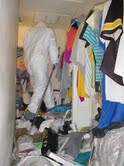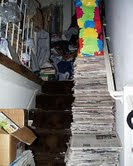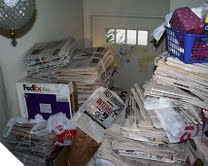Hoarding is a major safety and health hazard
 Do you know anyone with a house bursting with piles of old newspapers, broken furniture, or trash? You can help them clean up and get assistance by notifying the Fairfax County Hoarding Task Force. The task force investigates possible hoarding cases, determines whether the property is habitable, and helps the residents get the help they need.
Do you know anyone with a house bursting with piles of old newspapers, broken furniture, or trash? You can help them clean up and get assistance by notifying the Fairfax County Hoarding Task Force. The task force investigates possible hoarding cases, determines whether the property is habitable, and helps the residents get the help they need. According to the task force’s annual report, there are about 350 cases of hoarding per 100,000 people. That means Fairfax County, with a population of over 1 million, could be expected to have 3,500 people with hoarding problems. There are three active cases in the Mason District, says Christina Sadar, the new chair of the Hoarding Task Force. Ten cases investigated in Mason during the past have been closed. [The photos are from Fairfax County.]
The task force includes representatives from various county departments, including Family Services, Police, Sheriff’s Office, Animal Services, Fire and Rescue, Health, Housing and Community Development, Planning and Zoning, and Public Works.
A property is considered unsafe if the doors are blocked and it’s too difficult to get in and out safely, if there are other fire code violations, or if there are other major health and safety concerns, such as “a ton of animals and filth everywhere,” Sadar says. There was one townhouse in Centerville, for example, where “the whole house was one big filthy mess. Everything was broken, and the bathtub was filled with human feces.”
Hoarders who collect animals are a special case. Animal hoarding often starts when a person takes in a stray dog or cat, then keeps going. In one of the worst cases ever, an 82-year-old woman in the Mount Vernon area was arrested in 2005 when police discovered 488 cats in her home, 222 of them dead.
In extreme cases, the residents have to vacate the property immediately while the problems are addressed. But many cases investigated by the task force aren’t that severe. In one case in Springfield, for example, an elderly couple had a lot of stuff piled up and one door was blocked, but the house was not filthy. Some of the debris was cleared out, and the residents were able to stay in the house.
Most of the time, you can’t tell from the street that a person has a hoarding problem, Sadar says. Some clues include a backyard filled with junk or all the windows with shut curtains so you can’t see inside. “Most people who are hoarders know it’s wrong but don’t know how to deal with it,” Sadar says. Many times, they have regular jobs.
 Sadar attributes the increase in hoarding incidents to increased awareness about the issue. The TV show in the A&E channel, “Hoarders,” has drawn more attention to the issue, for example. Hoarding becomes more noticeable as communities are urbanized, and although hoarding affects people of all ages, races, and nationalities, it tends to be more prevalent among older adults. It’s often associated with anxiety, depression, obsessive-compulsive disorders, or mental health deterioration.
Sadar attributes the increase in hoarding incidents to increased awareness about the issue. The TV show in the A&E channel, “Hoarders,” has drawn more attention to the issue, for example. Hoarding becomes more noticeable as communities are urbanized, and although hoarding affects people of all ages, races, and nationalities, it tends to be more prevalent among older adults. It’s often associated with anxiety, depression, obsessive-compulsive disorders, or mental health deterioration.  The volume of hoarded items can cause structural damage to homes, such as sagging floors and ceilings, compromised bearing walls, and even the partial collapse of buildings—and can affect the structural safety of adjoining townhouses. Hoarding can also lead to unsanitary living conditions and the spread of disease through such conditions as unusable or inaccessible toilets and sinks, rat and insect infestations, and the increased risk of falling or tripping hazards.
The volume of hoarded items can cause structural damage to homes, such as sagging floors and ceilings, compromised bearing walls, and even the partial collapse of buildings—and can affect the structural safety of adjoining townhouses. Hoarding can also lead to unsanitary living conditions and the spread of disease through such conditions as unusable or inaccessible toilets and sinks, rat and insect infestations, and the increased risk of falling or tripping hazards.

What someone does in their own house should be their business…A fireman is not supposed to be a safe job, so if someone does not have gasoline or explosives, but just consumer items, then it should be legal and the scared fireman can look for working at a 7-11, not tell people how to live. Yetman, Grierson and these scum are the criminals–not the packrat homeowner minding his/her own business.
Unfortunately it affects other people around them, not just the person who hoards. It's also a sign that this individual needs help getting their life back on track. A person who hoards deserves respect but needs to be able to live in a healthy environment in order to really get past this point in their life. I commend the people who have been assigned to these sensitive situations in our county and other counties as well.
I own a townhouse in Northern Virginia and have a neighbor that had 3 dogs that never were let outside to use the bathroom for many years and her home is filled with trash and God knows what else. We all suffer as neighbors of hers. The smells that come from her home have made people move from their own homes next door to her. It's unfortunate that she has these problems but it has become a health hazard for all of us in the neighborhood.
At the moment Dirty Deeds Junk Removal 703-333-JUNK(5865) is there removing truckloads of items from her home. They have been there for days now and I don't know how many days more it will take them to finish. We all feel bad about our neighbors mental health issues and the attachment she has with her trash but the line has to be drawn somewhere. Thank you Fairfax County employees for enforcing the law and demanding she has her home and yard cleaned out and all the junk removed. I'm afraid that the house will need to be condemned after the trash and dog feces and urine is removed. It has to have soaked into the wood and concrete floors in the basement.The junk removal company is having to wear masks because the air quality is so bad in there. This is the same nasty air emitted every day that we've had to breath without masks for many years now. To point fingers at our government employees for enforcing the law, is just wrong. I believe in people having their own private space that they pay for but they shouldn't be allowed to ruin our private space that we pay for with their trash and negligence.